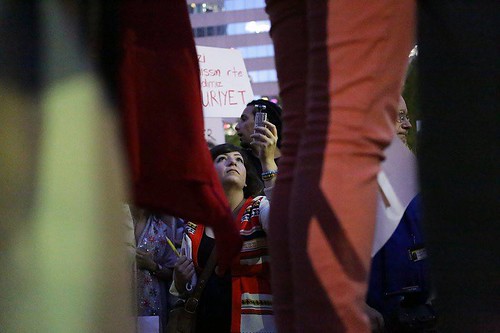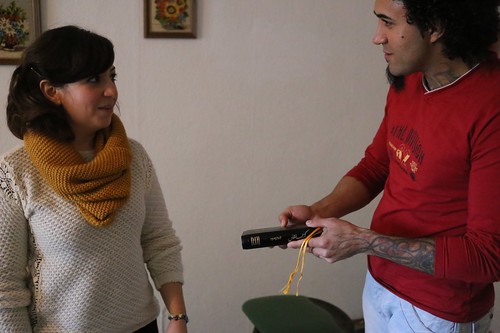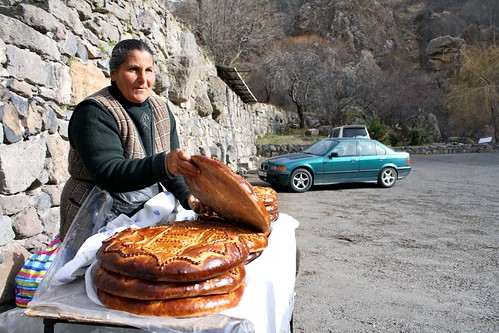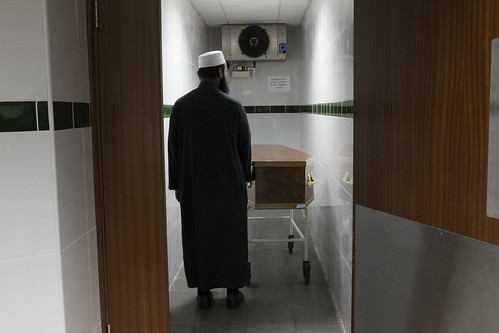With interests in marginalized and underreported communities and issues, immigration, displacement, and identity, freelance journalist Liana Aghajanian prefers the road less travelled. She is the editor of Ianyan Magazine, an independent online publication devoted to Armenia and its diaspora.
Liana’s work has been published in The New York Times, Al Jazeera America, The Guardian, The Atlantic, Foreign Policy, and the BBC, to name a few. In 2012, Aghajanian was selected as one of the Metlife Foundation Journalists in Aging Fellows, while in 2013, she was a religion fellow at the International Reporting Project.
Liana was born in Tehran, then moved to Los Angeles, where she spent most of her life. She now divides her time between London and Los Angeles, while travelling often to other locales, depending on where her work takes her. She finds that her various identities and experiences inform her work.
 In NK (Shushi) on a reporting trip with residents
In NK (Shushi) on a reporting trip with residents
How do you decide what topics and stories you will report? Do you consider the particular news outlet to which you will pitch the story? Does the audience or news media shape how you will tell the story?
It usually starts with my interests — my passion about the topic. If I’m not interested in it, it’s not going to be a good story for me. So every story that I end up pitching, and hopefully getting an editor to agree with me on, is an idea that I cultivated and I wanted to write about.
The good thing about doing journalism in the modern era is that there are so many publications that you can find an outlet that can match what your interests are. The problem with freelance journalism is the industry problem of getting paid [laughs]. There are so many places where you can write. You can write on sites, magazines’ blogs, whatever it is, but if you’re expecting to get paid a decent price for them, that’s a problem.
Does being Armenian influence your reporting? Do you have a preference for Armenian topics?
Yes, my identity does influence the kind of stuff that I cover. I struggled with my Armenian identity growing up in the US. I always felt like I didn’t have room in my mind or my body for two separate identities or more than one. And I guess over time that kind of changed; I kind of crafted my own Armenian identity for myself and found that I have room for more than one kind of identity.
Growing up in the Diaspora, I felt that a lot of the media — not just mainstream but Armenian media in the Diaspora — didn’t cover the issues that I always had questions about and wondered about. I felt that the perspective was very singular; it wasn’t a wide variety of stuff. So I thought, why don’t I just start doing that? I want to talk to people and explore issues that no one else really was covering that much, so that’s how I kind of fell into exploring more of my identity, which goes back to me saying I crafted my own identity because I went after the things that I was interested in.
 At a Turkish demonstration in Los Angeles
At a Turkish demonstration in Los Angeles
And I apply the same idea when I report outside the Armenian community; that is, finding the issues and people that are just kind of off on the sidelines. I feel I do the same in an Armenian context as well.
Because of that large disconnect that we often talk about between the Diaspora and Armenia, my goal was to kind of bridge that gap and give voices to issues that these two groups weren’t hearing about each other. So instead of concentrating on the Genocide, for example, or the Karabakh issue, I was more interested in the lives of LGBT Armenians in the Diaspora or in Armenia, minorities within Armenia, mental health issues, and so on.
Do you find that your role is to report the issues in Armenia to the Diaspora and vice-versa, i.e. Diasporan issues to Armenia?
When I’m reporting for mainstream outlets, not so much because the audience is different, but when I started my online magazine, the main audience was going to be Armenians and obviously the large portion of those were in the Diaspora.
The fact that I come from a background that is already on the fringes anyway has contributed to my seeking more communities that are like that. I think it has a lot do with it actually. I never wanted to pigeonhole myself. I didn’t want to make myself just someone who does or reports on Armenian issues.
 Yazidi woman making jam in Aragatsotn Province
Yazidi woman making jam in Aragatsotn Province
I’m Armenian, but I’m other identities too. I was born in Iran, so I have that very strong heritage; I grew up in the US, so there’s that. When I come to Armenia I feel so American. So I had to come to terms with the fact that I am a multi-layered person, but the thread lies in the fact, going back to my Armenian background, of being on the sidelines of it and applying that to other communities. So, it makes it easier for me. Like when I was in Germany reporting on Iranian refugees, it was really important for me to express to them that I come from an immigrant background as well, I’m a minority too. I think when you tell people that’s the space you’re coming from, it makes you connect with them more, and it makes your conversations with them easier and successful for your research and reporting.
How important is it to you to report Armenian issues? Where fellow Armenians have certain interests (most notably in the US with its powerful Armenian-American lobby), how important is it for your reporting to be tied to these interests?
As a journalist, I never want to tie myself to the interests of lobbying groups. That never factors into what I do. I never think of myself as advancing some kind of cause for the Diaspora when I’m reporting; I never see it as trying to accomplish something. I always go into it as a reporter except that I have the benefit of understanding the context and I know the language. That’s pretty much my advantage in all of this.
As I mentioned, I’ve reported on LGBT issues, mental health issues, and corruption, and you get varied opinions. Some people understand what you’re doing and believe in your reporting; other people call you a propaganda machine or tell you that you’re funded by the Turkish lobby.
 School children in Nairobi, Kenya
School children in Nairobi, Kenya
Have you been confronted with more serious expressions of disagreement, any backlash from the Armenian or non-Armenian community? It sounds like the negative reactions you’ve experienced have come more so from the Armenian community.
I can’t say that there has been that kind of negative thing. Often I have found that when I write something that I’m terrified could lead to something like that, there are voices and people out there who understand what you’re doing. There’s more of that than the negative stuff.
It’s tough because you’re Armenian and they see that your name is Armenian and their expectations of you have already been established. They expect something from you because of your last name.
At the end of the day, you’re putting yourself out there as journalist, as a person who’s in the media, so if you can’t take whatever’s coming back to you, then you shouldn’t be doing what you’re doing. Also, I think if you approach it in the right way, you lessen that.
For example, when this whole Starbucks controversy happened recently, you have to apply context to it — that’s what I’m always trying to do. I didn’t write anything about it because I just didn’t see any point; it just really didn’t matter to me that much. You have to provide context around those issues and not just focus on the issue and put your own personal assumptions on something. The same thing happened with the whole Kessab situation that spread like wildfire. Also, we Armenians sometimes tend to be very reactionary. So, I think that if we could just step back and look at bigger picture issues and concentrate on facts instead of wild rumors and try to think a little more like investigators instead of accusers. We just need to look at things in a wider way instead of going narrower and applying just our own personal feelings towards it.
 In Leipzig, Germany interviewing Iranian refugees
In Leipzig, Germany interviewing Iranian refugees
Your critical views on media campaigns initiated or encouraged by the Armenian diaspora tend to differ from other diasporan Armenians’ views expressed online. What is the response you’ve received to your critical comments? Have there been repercussions on your professional life?
I can’t say that I’ve received too much of a negative response. I always find when I get the courage to voice how I feel about those issues, there are people who I can have either discussions with who agree with me or disagree with me, but it’s all very cordial and it’s a learning experience: they teach me things that I should consider and vice-versa. But I wait a long time before I kind of say anything. That’s a rule I have of not being reactionary. I just wait and see what happens, and then if I feel strongly enough about it, I’ll make a comment.
I’m not someone who leans towards opinionated pieces. I don’t want to put myself in the story; I don’t want to have a strong opinion. I’m not a pundit. I’m not a commentator. I want to do actual reporting and I want other people to let me tell their stories. But there are certain issues because of my background and because of the time I’ve spent in Armenia, the media space I know of, I’m so familiar with the Armenian media space on the internet, that there are certain things where I feel the need to comment on and I only do it when I know my comment is going to present a useful point of view.
You know, we’re very opinionated people, Armenians. I don’t want to add to the noise. I don’t want to get angry or make some offhand comment. I want to back up what I am saying with facts or critical analysis and then do it. So yeah, I pick and choose what matters.
 Armenian woman with fresh made gata in winter in Geghard
Armenian woman with fresh made gata in winter in Geghard
Also, I feel like over time in my social media history, I’m more curating what I’m putting out there because of the fact that there’s just so much noise. These days I’m more careful about what I chose to write and what I put out there. I feel like if it’s not useful, I won’t post it.
I learn so much from what people post on social media. Twitter and Facebook have helped me to find my own kind of bridge towards Armenia in many ways. A lot of the times the perspectives of people living in Armenia are very much missing from our communities across the Diaspora. I think if more people paid attention to what’s coming out of social media their perspectives on things would change a lot. I think for me personally it has been a way to bridge those two communities together.
When you were in Yerevan last year, you pitched a story to a major US publication on how architecture in Armenia has changed over the years, but the publication turned down the story. How easy is it to pitch a story on Armenia or an Armenian topic to major US news media? How interesting is Armenia as a country to US media?
I learned pretty quickly early on that Armenia’s presence in terms of pitching to outlets is very slim to none. It’s a small country; it’s not massively important on any kind of major political scale, though I think that’s kind of changing now with people knowing about Armenia. I don’t think most people in the world either know or care about what’s happening in this tiny little country between Iran and Russia. It’s tough.
I’ve had a lot of editors turn down stories, but I’ve had a lot of editors accept stories. It depends on so many factors. For example, when I was in Armenia last year, I did a story for Al Jazeera America on the Yazidi communities in Armenia because of what was happening with ISIS in the news and that whole situation in Iraq. So that worked out because it was a timely topic presented in an alternative way.
 A Muslim undertaker in London
A Muslim undertaker in London
The Yazidi community is a part of Armenia that a lot of people in the Diaspora don’t know anything about. Going after these issues is important to me whether or not an editor accepts that assignment or I get paid for it, which goes back to the fact that we can think of journalism as a career, but if you don’t have the passion and compulsion to pursue these stories, you’re in the wrong field. That’s what it comes down to. I want to pursue those stories despite the challenges.
Any freelance journalist can tell you that in a given time period you’re going to have story acceptances, story rejections and then never hearing back, and then doing a story and then it getting canned. That’s just how it is. And much of the time you are financing all of this on your own.
I don’t feel like there is ever going to be a time in my life that I don’t come to Armenia or do an
Armenian-related story because I’m so personally interested and invested in it that even if an editor isn’t going to accept the story, my personal interest will keep me coming back.
One time a Diasporan asked me, “What do you see in it when you go there? What do you see in Armenia when you go?” I said when I’m in Armenia it makes me feel really raw; I feel really exposed; I feel like I have to think about things a lot; I have to think about every step I take, how I talk to somebody. I have to use the language that I know well, but I can stumble in because of different dialects or words being used, etiquette, social behaviour, what’s acceptable, what’s not. And every time I leave and then I come back, I have to start all over again.
Interview by Adrineh Der-Boghossian
Transcription by Mane Khachibabyan
